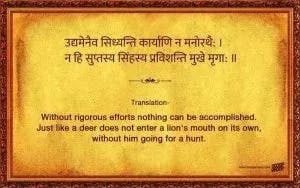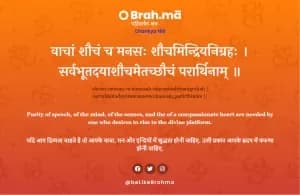Vedic Wisdom Inspired Corporate Management Part-1
Corporate management and administration system have been there since the advent of human society. As globalization takes place and the issues of management whether in administration system or commercial enterprise have, not to be global but also multicultural, the need to survey other cultural arises. Plus the basis of human motivation lay in cultural integrity so an analysis of corporate management standards that flow there from being an essential requirement for a globalized supervision system.
Management
Management is about formulating these exchanges as productive and beneficial. When there is a good trade, connections prosper and the community thrives. That is the path in which the first hymn of the Veda brings us. Fredrick Winslow Taylor (1856-1925) and Henri Fayol (1841-1925) are two personalities who’ve molded administration as a control taught in most corporate schools. Taylor pointed to the task while Fayol was further apprehensive about organizing people. But the Vedic concept of life is established on the belief that man is a crucial aspect of the global family – Vasudha- evakutumbakam. Also, the law of Karma (causation) is proclaimed as a law of nature.
It implies that every action of a person directs to set outcomes. Hence, it also proposes a path for peaceful co-existence. This path is called Karma Yoga. Vedic knowledge promotes the idea of incorporating ethics, understanding, ethical behavior, and good administration in corporate education through experiential wisdom, mentoring, discussions, ethical discipline, cognitive or mental learning, observance, and contemplation.
“Yamas and Niyamas” in Corporate Management

The Vedic path comprises of ten common rules of ethical conduct which showcases the direct connection with the corporate management. There are five for internal purity, called the Yamas – Satya or honesty, ahimsa or non-injury to others and treating all lives with respect, asteya or no cheating or deception, brahmacharya or celibacy and, aparigraha or no selfish aggregation of resources for one’s goal.
The five rules of conduct for exterior purification are the niyamas– shaucha or cleanliness and purity of mind and body, tapas or austerity and preservance, Upadhyay or study of the Vedas, and Santosh or contentment, as well as Ishvara- pranidhana, acceptance of the Supreme.
Ten qualities are the source of dharmic (righteous) life. These are dhriti (firmness or fortitude, kshma (forgiveness), dama (self–control), asteya (abstaining from stealing or dishonesty), shauch (purity), indriyanigraha (control over the senses), dhih(intellect), vidya(knowledge), Satyam (truth) and akrodhah (absence of anger).
The Principles of Purushartha
Conclusion

The Vedic texts encompass a wealth of significance. Moreover, their poetic grandeur, include comprehensive ultimata for a well-ordered and social life, great philosophic truth and even scientific laws. The Vedic Management beliefs cultured in the old-time are related to the current world and associations can have the best business model established on the law of Ethos. The wisdom and knowledge in the ancient Vedas show the righteous and ethical way to the entrepreneurs of the new & contemporary world.
...




